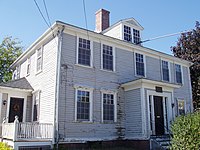User:Coriantumr15/sandbox
Revolutionary War Era[edit]
Much excitement was generated in Watertown towards the start of the American Revolutionary War period. In 1773, many of its citizens were engaged with the Sons of Liberty in another tax protest, this time against the British Tea Tax which resulted in the famous Boston Tea Party rebellion.[1]
Then later (April 1775), some 134 Watertown minutemen responded to the alarm from Lexington to rout the British redcoats from their march to Concord. Thereafter many of these citizen soldiers were part of the first battle line formed at the Siege of Boston. Another Watertown citizen, Israel Bissel, was the first rider to take the news of the British attack and rode all the way to Connecticut, New York and Philadelphia.[2][3][4]
The Massachusetts Provincial Congress, after adjournment from Concord, met from April to July 1775 in the First Parish Church, the site of which is marked by a monument. The Massachusetts General Court held its sessions here from 1775 to 1778. Committees met in the nearby Edmund Fowle House. Boston town meetings were held here during the siege of Boston, when many Boston families made their homes in the neighborhood. For several months early in the American Revolution the committees of safety and committee of correspondence made Watertown their headquarters and it was from here that General Joseph Warren set out for Bunker Hill.[5]


Here, the Treaty of Watertown, the first treaty signed between the newly formed United States of America and a foreign power, the St. John's and Mi'kmaq First Nations of Nova Scotia, was signed in this house.[6][7]
- ^ MainTour Watertown
- ^ "Bissell Outrode Paul Revere But History Left Him in the Dust", Hartford Courant, April 16, 2007
- ^ FindAGarave #28200928
- ^ The Five Riders of the US History
- ^ Hodges, Maud deLeigh. 1980. Crossroads on the Charles. Phoenix Publishing, Canaan, NH
- ^ https://archive.org/stream/documentaryhisto24main#page/164/mode/2up
- ^ Daniel N. Paul, We Were Not the Savages: A Mi'kmaq Perspective on the Collision between European and Native American Civilizations (2000), pp. 169-170 (includes full text of both treaties).
